The very idea of "retroactive immunity" for lawbreaking corporations is so radical, so repugnant to the most basic principles of the "rule of law," that only one prior attempt can be found in recent history (at least from my research): the efforts by some in Congress in 1965 to enact a law retroactively legalizing the mergers by six large banks which clearly -- as a federal court found -- were illegal under our nation's antitrust laws.
The banks knew when they merged that they were almost certainly violating anti-trust laws. But they did it anyway. And when courts began ruling that their behavior was illegal, they ran to Congress to demand that a law be passed granting them amnesty, claiming that the consequences would be ruinous if they were held accountable under the law.
But the very concept of retroactive amnesty -- the idea that corporations could break the law and then have Congress pass a special law legalizing their lawbreaking conduct -- was so profoundly offensive to Sen. Robert Kennedy (who had been the Attorney General when the banks broke the law with their mergers), as well as then-Attorney General Nicholas Katzenbach, that they engaged in extraordinary efforts to try to put a stop to this Congressional travesty:

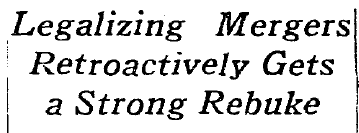

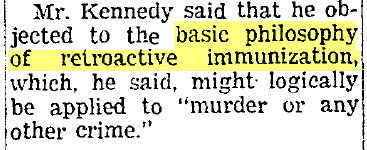
The circumstances between then and now are virtually identical. Just like then, the corporations seeking retroactive amnesty knew at the time they broke the law that their conduct was illegal, and -- just like now -- a court had so ruled, which is why they ran to Congress asking for a special law to be passed legalizing their criminal behavior (on the ground that the American economy would be crippled if the mergers were undone):
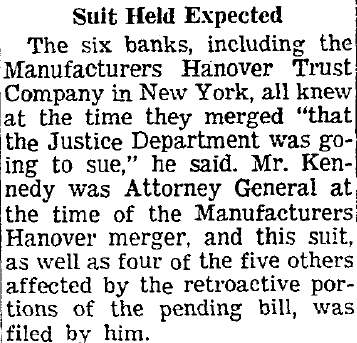
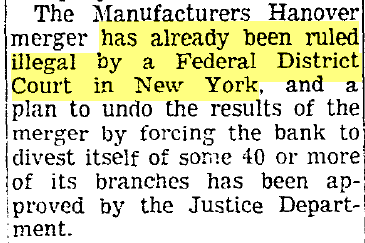 The Attorney General at the time, Nicholas Katzenbach, was equally appalled that the Congress would do something as plainly corrupt and lawless as enact a bill to legalize behavior by an industry that just flagrantly decided to break the law:
The Attorney General at the time, Nicholas Katzenbach, was equally appalled that the Congress would do something as plainly corrupt and lawless as enact a bill to legalize behavior by an industry that just flagrantly decided to break the law: 
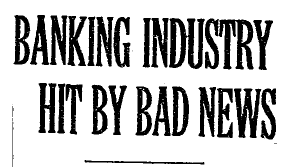
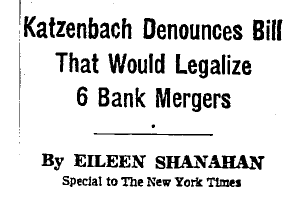

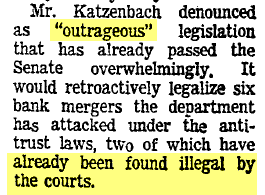
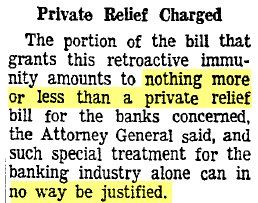 .
.
Just as now, the lawbreaking banks insisted that they must be protected from the devastating consequences of their lawbreaking -- claims that Kennedy and Katzenbach easily destroyed. After all, the banks -- like the telecoms now -- were the ones who chose to break the law, knowing that it was illegal, because they perceived there to be great economic benefit in doing so. To then grant them amnesty would be to reward lawbreaking.
The Democratic Party has gone from Robert Kennedy and Nicholas Katzenbach standing up eloquently and aggressively for the rule of law (h/t reader JF) -- even in the face of fear-mongering claims that undoing those mergers would cripple the economy -- to Jay Rockefeller plotting in secret for months with Dick Cheney as to how they can protect lawbreaking telecoms from the court battles they are losing and immunize them from the consequences of their criminal conduct in allowing warrantless spying for years on American citizens.
That steeply downward fall -- from Robert Kennedy and the rule of law to the Cheney/Rockefeller telecom amnesty deal -- illustrates so many things about what has happened to our country.



Shares